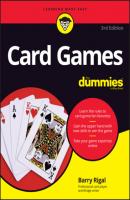Card Games For Dummies. Barry Rigal
Чтение книги онлайн.

Читать онлайн книгу Card Games For Dummies - Barry Rigal страница 20
Название: Card Games For Dummies
Автор: Barry Rigal
Издательство: John Wiley & Sons Limited
Жанр: Сделай Сам
isbn: 9781119880448
isbn:
Because they cleared a foundation pile earlier in the turn, Player A puts out one of the aces from their hand to start a new pile; now they can play the 2 from the reserve onto that ace (turning over another queen). They take the 9 and 10 back off waste pile D and onto the 8 in the foundation, and they use the king as a wild card to represent a jack. These moves allow them to take the queen from their reserve and put it on the jack to complete another set on the foundation. Now they can take that pile away. They turn over another 2 on the reserve, which is perfect: It allows them to play the second ace from their hand, and the 2 from the reserve goes on that. They turn over a new card on the reserve pile. And because they used up all five cards in their hand, Player A draws five new cards and can continue if they want to.
If they have no moves they want to make, they can end their turn by making one discard to any of their waste piles and picking up a replacement card from the stock.
Manipulating your stoppage time
Say your opponent in this game, Player B, indicates that they can’t play, and you can see that the top cards on their waste piles are 10, 9, 6, and 2. You now know that whatever they have in their hand isn’t one of the following cards: K, 10, 9, 8, 6, 5, or 2. If they had any of these numbers, they would have to discard onto their waste pile (remember, the only cards you can put onto a waste pile are cards of the same value, or one lower, than the top card there).
Similarly, you can look at the foundation piles, see that one pile has a 3 on it, and infer that your opponent doesn’t have any 4s. So what you must do is ensure that you never leave the foundation piles in a position to allow them to put a Q, J, 7, 3, or ace up — the only cards they can have in their hand. If you can do that, you stop them playing for the duration, which has to be a good idea.
If both players can’t move, you collect all the waste piles and hands, shuffle them up, and redeal new hands. You leave the reserve piles as they are.
Spite and Malice is an excellent competitive game; you have to watch your own cards, plan how best to get rid of them, figure out how to use up your reserve pile, and strategize how to discard onto your waste pile. But equally important is spoiling your opponent’s strategy, blocking their reserve pile, preventing them playing from their waste piles by taking the foundation piles past convenient numbers, and generally making yourself a nuisance.
The game ends when one player gets rid of their reserve pile, and the other player records how many cards they have left. The game is ideal for an ongoing struggle (say 20 years or so), as is the case for two of my friends who’ve been playing it for that long.
SOLITAIRE ON THE WEB
The Web offers a wide variety of sites for the Solitaire enthusiast. You can find tons of Solitaire games to play online for free; for example, you can go www.247solitaire.com.
Chapter 3
Children’s Games
IN THIS CHAPTER
Just because this chapter refers to children, adults should not pass it by and ignore the contents. The games in this chapter are suitable for a range of players — younger players, new players, adults playing with younger players, or players who just like fast-action card games that are easy to pick up and fun to play. (All the most enthusiastic Spit players I have met have been adults: It is more a question of attitude than age.) So, whoever you are, you sure to find a game in this chapter to enjoy.
Additionally, several games in other chapters of this book are just as suitable for children as the ones described here. Eights, also known as Crazy Eights (Chapter 6), President (Chapter 17), and Whist (Chapter 8) come to mind.
Beggar My Neighbor
Beggar My Neighbor, also known as Beat Your Neighbor Out of Doors and Strip Jack Naked, requires no strategy or planning at all, making it a great game for kids and for social situations. The objective of the game is to win all the cards from the other players.
Two to six players: You can play with more than six players in a pinch.
A standard deck of 52 cards: With four or more players, add a second deck of cards. A great advantage of this game is that you don’t really need a complete deck of cards — a card or two gone missing is almost irrelevant. Don’t forget to remove the jokers!
To СКАЧАТЬ